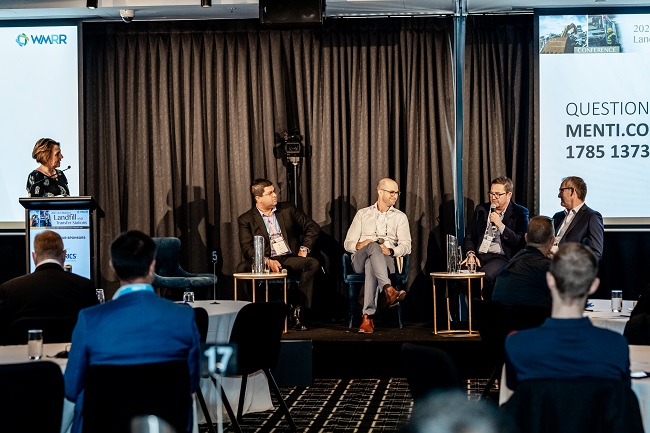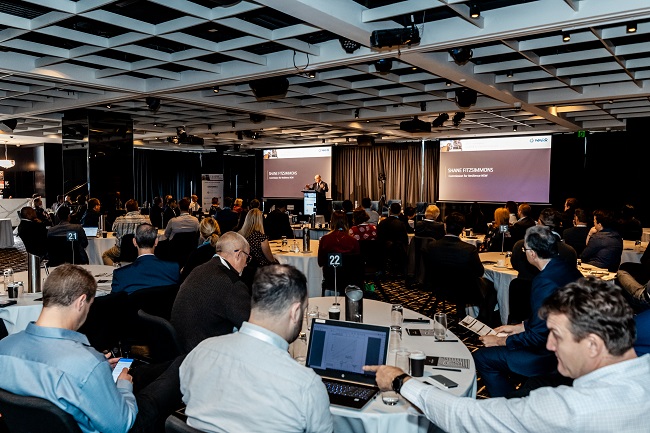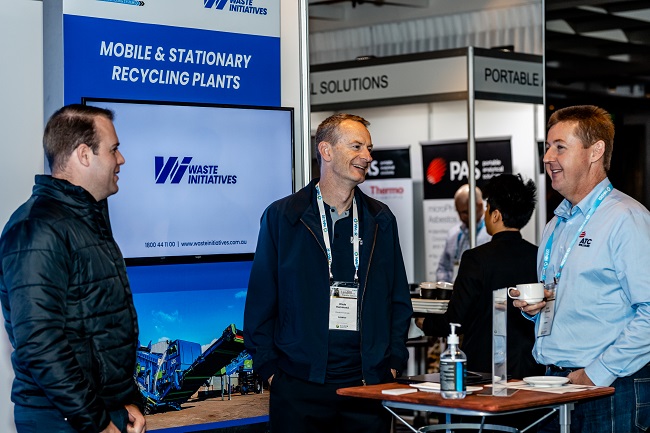ALTS 2021 reveals an enduring, essential and evolving role for Australia’s landfills and transfer stations
23 June 2021
Supported by platinum sponsor Geofabrics and gold sponsor Global Synthetics, WMMR’s 2021 Australian Landfill & Transfer Stations conference (ALTS 2021) on 8-10 June 2021 brought together industry leaders, government representatives and technical experts against the sparkling backdrop of Sydney’s CBD and Darling Harbour.
Hosted at Doltone House on Pyrmont’s picturesque Darling Island, the three (3)-day event, which kicked off with a pre-conference technical workshop on 8 June, was packed with discussions on the policy, regulation and technology that are shaping the future of landfills and transfer stations in Australia, and the shifting role of this infrastructure in our essential waste and resource recovery (WARR) industry. Shining through was the message that landfills and transfer stations will always play an integral role in material management for the community – even, and perhaps especially, as we transition to a low-carbon and circular economy.

A critical role for landfills and transfer stations in disaster management
This running theme was established as Resilience NSW Commissioner Shane Fitzsimmons opened ALTS 2021 by reflecting on his time as NSW Rural Fire Service Commissioner. Commissioner Fitzsimmons pointed to the vital partnerships between landfill and transfer operators and disaster recovery teams in the wake of the devastating 2019-20 Black Summer bushfires and recent flood event in NSW.
It was noted that landfills and transfer stations are key in responding to increasingly frequent and intense natural hazards and other climate change-related challenges in Australia. These facilities must be resilient and flexible to manage spikes in residual waste streams from debris and damage during disasters.
Later in the conference, John Anderson and Charlie Hartline of Public Works Advisory NSW spoke further on the vital partnerships between government agencies and the WARR industry during disasters. They explained how the sheer scale of recent emergencies has catalysed a paradigm shift in best practice disaster management in NSW, increasing the speed with which relationships are formed and responses coordinated. Again, this requires the support of robust yet agile WARR industry.

Managing residual and hazardous materials
Another theme explored was hazardous and contaminated materials as persistent sources of residual waste, even as we claim to be embracing a circular economy. Coupled with increases in medical waste streams from COVID-19 and continuing efforts in asbestos removal and disposal, PFAS and its detection, treatment and disposal are a mounting challenge (like other Persistent Organic Pollutants).
Per- and polyfluoroalkyl substances (PFAS) – the umbrella term for a group of bioaccumulating chemicals widely used in manufacturing since the 1940s – is an ongoing and ubiquitous challenge. Although landfills are the recipients of, and often safest option for, managing such hazards, ALTS 2021 highlighted stubborn social and political barriers to the provision of this essential service. As residential areas grow and steadily encroach on neighbouring landfill sites, PFAS disposal is an especially emotive topic, with little understanding that landfills are but the end-of-pipe solution for these materials (and not the generators of it!).
During the EPA keynote panel on state policies and priorities for waste and landfill classification, speakers from EPAs in New South Wales, South Australia, and the ACT, as well as Queensland’s Department of Environment and Science touched on the regulatory challenges surrounding PFAS disposal. In South Australia for example, a recently introduced private members bill proposing a ban on PFAS disposal at certain landfills in the state poses an impracticable roadblock to a necessary course of action.
To reassure the public and diffuse political tension towards securing an all-important – though often elusive – social license for landfills and transfer stations, the EPA panel pointed to the value of transparent, consistent community engagement. As well as listening and responding to community concerns, this involves informing stakeholders about the safeguards used to manage risks during contaminant disposal. Luckily, ALTS 2021 revealed no shortage of research and development in this area!
Geofabrics’ Ryan Hackney presented the company’s work towards developing hybrid geosynthetic clay liners that can attenuate PFAS in leachate. Adding to discussion on the potential for geosynthetics to help safely manage PFAS in landfills was Monash University’s Dr Malek Bouazza, joining us via Zoom from Victoria. Dr Bouazza’s keynote presentation on day two (2) emphasised the need for further research into the way that PFAS migrates through liners in different settings to help manage challenges to landfill design and contaminant management into the future.
A different angle to managing PFAS contaminants was OPEC Systems’ Surface Action Foam Fractionation (SAFF®) method, presented at ALTS 2021 by its co-inventor David Burns. Designed in Penrith, Australia and piloted overseas at Telge Landfill in Sweden, SAFF® is an innovative method that filters contaminants such as PFAS from landfill leachate and other liquids using air bubbles. OPEC Systems is also engaging with the community towards building trust and understanding of their products and services. Freely accessible webinar recordings on its website are there to inform the public about the method and technology underpinning SAFF®. Slowly but surely, David says, this is working.
Policy and regulatory barriers to modern landfills and transfer stations
ALTS 2021 explored the obstacle for landfill and transfer station operators in the divergent WARR policy approaches taken by the respective states and territories to similar issues. Disparate regulatory frameworks are increasingly problematic, particularly as transfer stations and landfills evolve beyond residual waste disposal towards performing higher order recovery and material management functions such as recovery and recycling; one example being the various approaches to landfill levies and exemptions, presented to conference attendees by Anthony Dixon from GHD.
Differing strict classifications on what services certain facilities can and cannot perform are a barrier preventing landfill and transfer stations from performing higher value functions needed to support the circular economy transition.
In response to concerns from WARR industry proponents, state and territory government representatives at the conference conversely stressed the need for bespoke waste management solutions between and within certain jurisdictions – particularly for regional, remote and First Nations communities – however, industry queried how a level playing field or certainty can be provided for investment without clarity of solution and expectation.
While this tension shows a ‘one size fits all’ solution to governance is perhaps unfeasible, the need for regulatory clarity, harmony, and flexibility – as distinct from a uniform nation-wide framework – is apparent as the WARR capabilities of landfills and transfer stations change and expand beyond disposal.

Landfills, carbon abatement, and climate change
The overlooked potential of landfills to support climate change mitigation also cropped up. Tiana Nairn of LMS Energy detailed the impressive performance of landfills in Australian carbon abatement – landfill biogas is responsible for ~30% of all ACCUs issued under the Emissions Reduction Fund (ERF) to date. Landfill operators can see their facilities dramatically reduce emissions and generate revenue by implementing biogas capture and generation methods that turn fugitive methane released by decomposing matter into energy. Mockinya Consulting’s Paul Lightbody, who was also a member of the ALTS committee, similarly underscored how changing from a compliance-based approach to landfill management to one of best practice can significantly increase the sustainability of facilities.
John Jones, NSW Land Manager at SUEZ, also explored improved landfill management with a deep dive into ‘landfill lean’ practices and the landfill manager skills matrix. By adopting this approach, based on the principle of continuous improvement, landfill operators can optimise work processes, purposes, people, and overall performance. John was joined by Rory San Miguel, CEO of Propeller Aero, who highlighted the merits of new technology such as artificial intelligence (AI), machine learning and the Internet of Things (IoT) in supporting a landfill lean approach. His company’s 3D mapping software uses drones that provide insights for reducing costs and maximising the efficiency of landfill operations.
Ultimately, conversations from ALTS 2021 showed that the landfills and transfer stations of our essential industry are much more than repositories for residual waste. Today, they are increasingly vital links as we recalibrate our economy and systems onto paths of greater sustainability.
As well as accommodating continuing, residual waste streams, modern landfills and transfer stations have the capacity to perform a range of higher order material management services. These facilities are moreover key in supporting emergency services during disasters, safely managing emerging contaminants such as PFAS, and play a role in mitigating climate change.
To safeguard this emerging potential, states must pursue regulatory consistency whilst adopting a holistic approach to WARR governance and regulation. Equally important is the need for WARR industry players to actively seek social license through education and engagement campaigns that break down barriers with the local public.
With these conditions met, Australia can embrace the supportive potential of our landfills and transfer stations as we move towards a low-carbon and circular economy.
Thanks to all of our conference sponsors - Geofabrics, Global Synthetics, Cleanaway, Tonkin, Golder, ResourceCo, SUEZ, LMS Energy, Tonkin+Taylor and GHD, as well as to our program committee:
WMRR’s 2021 ALTS conference could not have happened without your support and contributions.
If you attended ALTS 2021, we’re keen to hear about your experience. Please fill in our short post-conference survey – we promise it will only take a couple of minutes!